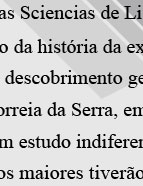

................................
Although disperse, the articles composing Portugal nos mares [Portugal in the seas] also contained useful reflections on Portuguese expansion. Despite these decisive contributions, the Portuguese historiographic milieu was still unable to accomplish a synthesis and make use of what was being produced by erudition. Another publication - less elaborate and targeting a wider public - was História de Portugal [History of Portugal] (in 8 vols, 1869-1874) by Pinheiro Chagas, which did not exert a lasting influence that could be compared to the work of Oliveira Martins.
It was not by chance that the great centenary commemorations - aimed at exalting the identity and consciousness of nationality - were linked to the Discoveries. Exalting the memory of the golden period of nationality might boost energies and trigger a rebirth of collective will. Hence, it was Camões in 1880, Prince Henry the Navigator (more modestly and mainly significant in Oporto, his birthplace) in 1894, Vasco da Gama's voyage to India in 1898, and the discovery of Brazil in 1900. The only exception was the Centenary of the Marquês de Pombal [Marquis of Pombal] in 1882, which sought other grounds, and that of Santo António [St. Anthony], which was a fiasco, in 1895 (M. I. João, Memoria... [Memory…], 2202, pp. 52-55). However, and rightly so, Portugal participated in the Spanish commemorations of the discovery of America by Christopher Columbus. The history of the discoveries was thus used in a programmed patriotic exaltation.
Related to this movement of interests behind the publication of many studies and documents on the discoveries and colonisation - in which the Trabalhos Nauticos dos Portugueses nos séculos XV e XVI [Portuguese Nautical Works in the 15th and 16th centuries] of Sousa Viterbo should not be forgotten - some historians were advancing remarkable hypotheses and stimulating interpretations. Such was the case of the multiple publications - especially from England - of Jaime Batalha Reis, a true geographer capable of thinking shrewdly like a historian. He was interested in demonstrating Portugal's priority to discover seas and lands: mainly inland Africa, since this was required to defend the Portuguese colonies against the greedy advances of the European powers. Indeed, Batalha Reis was even invited to participate as "a kind of geographic consultant to the Portuguese missions" in several international meetings (J. Batalha Reis, Estudos... [Studies…], 1941, p. 485). In fact, the methodological tools of the incipient discipline appeared to derive more from geography than from history.
